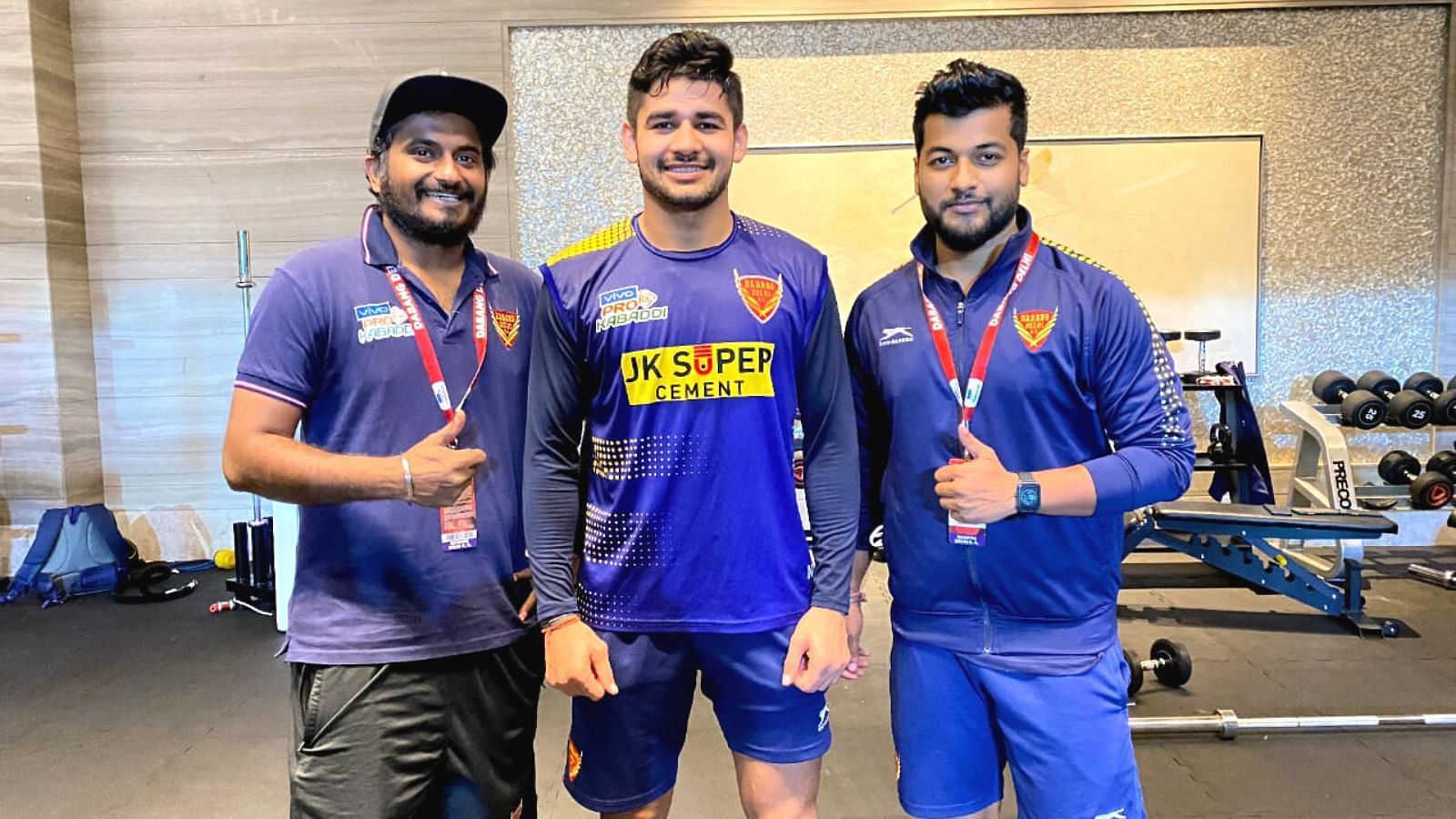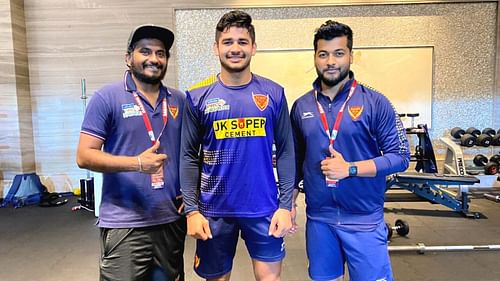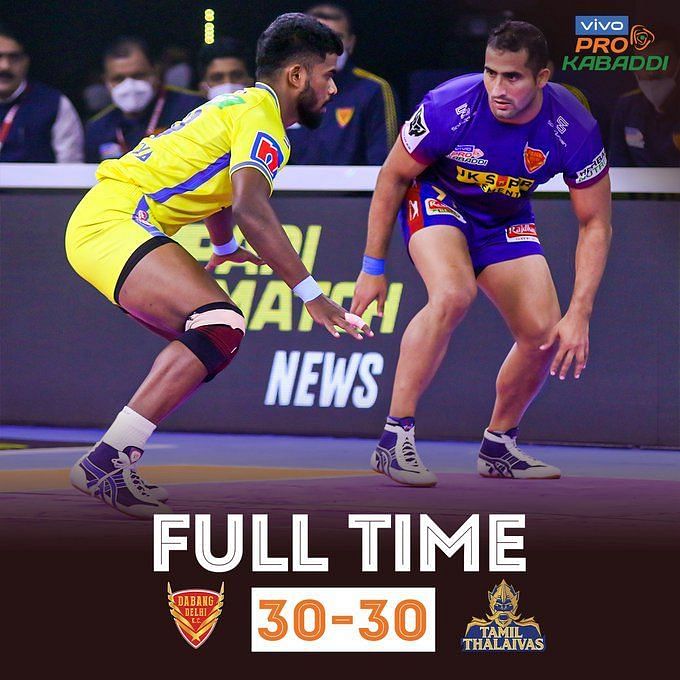
Decoding the secrets of managing a PKL team

For anyone who follows the Pro Kabaddi League (PKL), knows that this league has changed the game of Kabaddi globally. For a sport to succeed, it needs the coordination of several stakeholders, who when put in the right efforts in the right places, help the ecosystem rise and reach greater heights.
Similarly, for any PKL team to run, we need a few backend staff who make things happen and make everything look easy on the screen. In any sport, it’s the team manager who plays a mother-like-figure in the team so that the players can only focus on the game and not worry about anything else.
Sportskeeda caught up with Omkar Prabhu and Prem Kishan, who manage the Season 7 runners-up Dabang Delhi, to understand what goes behind the scenes in managing a Pro Kabaddi team and their perspective on the players in the league.
Read: https://www.sportskeeda.com/kabaddi/pro-kabaddi-2021-dabang-delhi-kc-time-table-complete-schedule
Omkar is one of the oldest managers in the league and has been with Dabang Delhi since Season 2 while Prem, who has an MBA degree in Sports Management from IIM, Rohtak, has been roped in as the Assistant Team Manager to help Omkar.
When asked about Omkar’s experience in the league, he said:
“The experience has been very good and satisfying. As you know, I have been working with Dabang Delhi from Season 2 onwards, it’s been an exciting journey till now as I have got to work with the players and understand them personally, understand their mentalities, understand where they stand at the moment, and most important of all, keeping them all together.”
For any team manager, they have to take care of players’ media, their logistics, their kits, which is almost the same for every sport, but apart from that Omkar is also part of the team’s auction strategy, retentions and also takes up the responsibility of scouting new talent in the off-season.
The life of a full-time team manager is as exciting as one could imagine. While for six months in a normal year (not inside a bubble) they stay and travel with the main team, for the rest half of the year they are involved in the backend work which is crucial in building the team.
“In the start, one month goes out in closing the season, starting from the financials to the payments to logistics and much more. In the rest 3-4 months, most of my time has gone into talent scouting, preparing auction strategy, and player retention. We at DDKC have always wanted to retain our core group at all times. There are the nationals and many other domestic kabaddi tournaments that happen all around the year, so, I and coach usually go and pick up new talents,” said Omkar when asked about his day-to-day roles during the off-season.
The star raider of PKL Naveen Kumar is also one of those NYPs (New Young Players) who had been scouted from these small leagues and was given a chance to display his prowess in PKL. And the rest is history!
PKL has been a league of “perform or perish”. Many players have come in as one season wonders and have disappeared soon too. The same has been the case for Omkar, who never in his wildest of dreams had thought that he would be the team manager of a PKL team.
Starting his career as an intern with Mumbai Indians back in 2012, Omkar has been the backbone of Dabang Delhi ever since he joined. After freelancing with them for two seasons, he was hired as a permanent employee and has taken up the task of making DDKC the most successful franchise.
Read: https://www.sportskeeda.com/kabaddi/news-pro-kabaddi-2021-naveen-kumar-becomes-fastest-player-score-500-raid-points-pkl-history
Meanwhile, Prem - the Assistant Team Manager - who has six years of experience in the sports industry, has taken up the onus to take care of the franchise inside the bio-bubble.
When asked about the impact of Covid-19 on the league, Prem had mixed opinions. He said,
“There are always two sides to how you look at things, I believe the pandemic had a dual impact too: Firstly, the athletes are not going to get an opportunity to perform in front of their home crowd/fans, and the fans are also going to miss the in-stadia live match experience. In addition to this, there is a financial loss to the franchise and the league as well, which is a great loss for all three stakeholders.”
The detailed Pro Kabaddi schedule are available here.
PKL has evolved like no other league has
If we compare the league and its players from what it was in 2014 until now, the transformation has been immense, and with time the Kabaddi players have evolved a lot too.
Read: https://www.sportskeeda.com/kabaddi/news-pro-kabaddi-2021-naveen-kumar-becomes-fastest-player-score-500-raid-points-pkl-history
Most of the players come from very humble backgrounds, mostly from the remotest areas of the country, and for them coming on television is nothing short of a dream. With time, they have evolved and have made sure that kabaddi is the next big thing in India.
The money that comes into the game has changed everything. From playing on mud to playing on the mat with the world watching, players have made sure that they match the standards of big leagues like IPL or ISL.
“You must have seen players have started doing advertisements and are getting themselves marketed too. That’s one of the biggest transformations that PKL has made in the lives of Kabaddi players. They have evolved with time, and I think in the next 5-6 years if Kabaddi is marketed properly and with the right knowledge, kabaddi players are going to reach new heights,” said Omkar over the phone from the bio-bubble in Bengaluru.
Iran is another heavyweight Kabaddi nation that has given India enough fight in international tournaments as a result of which many Iranian players have become part of the league. When Omkar was asked if communication was an issue among desi kabaddi players and the foreigners, he said,
“In every sport, you will see this barrier is there, but players have become adaptable to these changes. If you see in ISL also, there are many Spanish players and coaches who don’t know English but they have been successful in the league. So communication isn’t that difficult as the players have become adaptable to the situations.”
Omkar said team managers need to step in as mediators only at times when players aren’t able to understand what coaches are trying to convey.
The pandemic has definitely made the players mentally stronger, as in staying inside bio-bubble, staying away from their families, continuing the training, going through tests every day, being in quarantine, and so on. New techniques and practices have also been adopted to make sure that kabaddi stays updated with the world.
“Because of the pandemic, kabaddi players and coaches were exposed to new training methods which is a different experience altogether. For example, the players and coaches were introduced to online training whenever they were in quarantine so that they are always match-ready. This was new to almost all the players. We have to adapt to the time and situation. That’s what makes a sportsperson versatile,” said Prem.
Additional pressure of tests and safety during the pandemic
With the tournament happening inside a safe bio-bubble environment in Bengaluru, the number of tests has skyrocketed. For that, the workload of team managers has increased a lot.
“Definitely, the additional pressure is there, although we are staying inside a very safe bio bubble environment, we have to go through mandatory RAT, RT-PCR tests each alternate day and also update the league about the test reports. We have to make sure the masks are on as soon as players move out of their rooms. Making players aware about the SOPs and Protocols of the tournament was one big task that we pulled off”, said Prem, who has been brought up in Delhi but has his roots in Odisha.
“A RAT test on each match-day is mandatory. Test results create that slight consciousness in the minds of the players, coach, and the management, but the good thing is the players have shown a very disciplined approach and taken care of their own safety,” added Prem.
Perks of being a Team Manager
Omkar, who is also a part-time entrepreneur, says that he took up sports because he loved the feeling of being at the stadiums. Staying and traveling with the team is perhaps the most rewarding part of being a team manager. Apart from that, you get to understand a player’s and coach’s perspective and the way they see the game.
Prem says managing all the stakeholders is an experience and challenge as well. Liaising with the league to get the required slots of practice sessions as all the 12 teams are staying at one venue inside the bio-bubble, media interaction/ interviews, sponsor & league shoots, managing the social media and much more is a lifetime experience for the 28-year old.
When asked about who was the most notorious in the team, both of them had the same answer and it was the man from Haryana, Sandeep Narwal. Dabang Delhi, which finished runners-up in the last edition, has also been in prolific form this season and would love to take home the championship this time!
